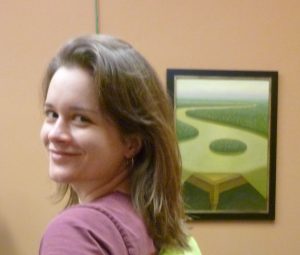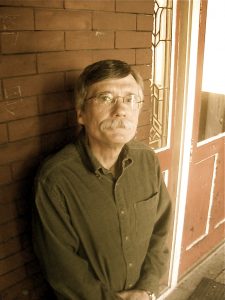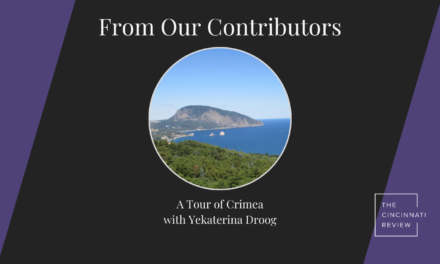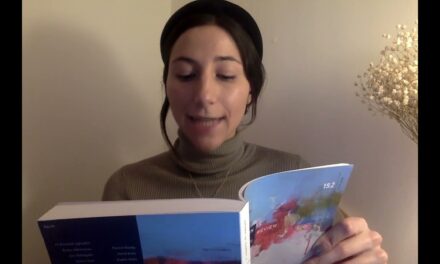We’re trying something new and different—a collaboration with the amazing online magazine Soapbox.
Soapbox tells the new Cincinnati story—a narrative of creative people and businesses, new development, cool places to live, and the best places to work and play. And each month, Cincinnati Review will contribute some of the best lit—poetry, fiction, and nonfiction—in the country. The full text of a poem or story will run in Soapbox, and we at Cincinnati Review will post on our blog “bonus material” in the form of comments from the writer and our staff, including the editor who accepted the piece for publication.
Our first collaboration features a poem that appeared in issue 8.1: “For I Will Consider” by Terese Coe. If you don’t have a copy on hand, you can read it in Soapbox by clicking here. Look for our next feature—a fiction selection—in February!
 Terese Coe’s poems and translations have recently appeared in The Times Literary Supplement, Ploughshares, Threepenny Review, Poetry, Agenda, New American Writing, Orbis, and Cyphers, among numerous others, and will soon appear in Alaska Quarterly Review and The Connecticut Review. Her first collection of poems, The Everyday Uncommon, won a Word Press publication prize and was published in 2005.
Terese Coe’s poems and translations have recently appeared in The Times Literary Supplement, Ploughshares, Threepenny Review, Poetry, Agenda, New American Writing, Orbis, and Cyphers, among numerous others, and will soon appear in Alaska Quarterly Review and The Connecticut Review. Her first collection of poems, The Everyday Uncommon, won a Word Press publication prize and was published in 2005.
Terese Coe: Normally I don’t care to track how my poems were written, but this case is different. It came to me suddenly after rereading Christopher Smart. The lines flew off my pen. There were more than twice as many as now. At first it was a straight intuitive/objective exploration of the individual, a loading of facts and now and then an attempt at reasoning them out. Smart’s “For I Will Consider My Cat Jeoffry” is partially a search for cause and effect, as in the Psalms, but for me that search emerged more clearly in the writing process. I put together a list of one cause that lead to another—as if it could make sense, or explicate existence. But nothing can make sense of existence. Nothing can make sense of the outlandish crevasse between life and death.
Some months later I began trying to reorder the lines, cutting whatever seemed out of place and trying different permutations. I did not add; I simply cut. I knew the poem needed gravitas. I wanted irony only at the end.
It is a story told in the form of litany, or dialogue with oneself, which makes it essentially dramatic. I find the lines are more open to variation in performance than I had expected, and that is characteristic of drama. The meaning varies according to vocal inflection, tone, and mood variations, like dialogue. Of course, it is also a dramatic monologue in which the lines have immediacy and flexibility. And the poem is peculiar in that it doesn’t seem to matter that most of the lines are quite unlike contemporary dramatic dialogue. Smart’s style adds something enigmatic to the subject/protagonist, and that produces a counterpoint to his evident interest in nature and the natural.
 Lisa Ampleman, Assistant Editor: Although the long lines and anaphora of Coe’s poem may call up Walt Whitman’s ghost for some readers, “For I Will Consider” is more directly indebted to Christopher Smart, an eighteenth-century writer best known for “his reckless drinking and spending habits” and “religious mania” (as the Academy of American Poets puts it)—and for writing a poem celebrating his cat, Jeoffry.
Lisa Ampleman, Assistant Editor: Although the long lines and anaphora of Coe’s poem may call up Walt Whitman’s ghost for some readers, “For I Will Consider” is more directly indebted to Christopher Smart, an eighteenth-century writer best known for “his reckless drinking and spending habits” and “religious mania” (as the Academy of American Poets puts it)—and for writing a poem celebrating his cat, Jeoffry.
That poem (link: http://www.poets.org/viewmedia.php/prmMID/15798), from Jubilate Agno, captures the cat-ness of the cat as he “sharpens his paws by wood” and “can catch the cork and toss it again.” This cat, however, also is “hated by the hypocrite and miser” and “knows that God is his Saviour”—atypical feline traits.
As we read Coe’s poem, we think about how Shay seems cat-like: fishing is his way of nourishment, he needs little to survive, and he sleeps on the carpet and is pleased. However, he is also one with his dog and tinkers with the Kawasaki—things Jeoffry would be unlikely to enjoy.
 Matt McBride, Associate Editor: I like to think of poems as perpetual motion machines, little Rube Goldberg devices of language that accomplish the impossible—they add up to more than the sum of their parts; they make something out of nothing. The most engaging thing, for me, about Terese Coe’s poem is the way it generates itself, the way it pushes itself along by its own momentum.
Matt McBride, Associate Editor: I like to think of poems as perpetual motion machines, little Rube Goldberg devices of language that accomplish the impossible—they add up to more than the sum of their parts; they make something out of nothing. The most engaging thing, for me, about Terese Coe’s poem is the way it generates itself, the way it pushes itself along by its own momentum.
Coe does this through the use of repetition. By beginning each line with “For,” Coe sets us up for a poem that will be nothing more than a list with each object weighted equally. However, we quickly see that is not the case. Repetition inherently lends import. This import, though, can quickly become hollow, a weight without substance (see for example every political slogan ever). Coe prevents this by subtly raising the stakes as the poem progresses, matching the poem’s content with the power generated by the repetition, so the “For at the first glance of a girl in his direction he worships dutifully” becomes, a few lines later, “For thirdly he works not upon relationship but extends himself quietly.” The “For fishing is his way of nourishment” becomes “For the sea is in him” in the next line.
And this is what makes this piece so beautiful for me, the way it accrues. Coe’s poem is like snow, or the Dirty Harry films. Any single discrete part of the larger whole is not in itself amazing, but somehow these seemingly unimpressive parts (though many of the individual lines do have a kind of beauty in their sentiment and expression) add up to a value larger than the constituent elements.
 Don Bogen, Poetry Editor: Back in Issue 4.1 (Winter 2007), we published Terese Coe’s “Boy Hustler”—a smart, tough sonnet spoken by the title character—and I was delighted to have another rich and energetic piece of work for the latest issue. Except for the fact that they are both young men, the figures the two poems present have little in common. The forms of the poems are different as well, but in both cases Coe really livens up the conventions. Those lines about the cat Jeoffry from Christopher Smart’s Jubilate Agno are among my all-time favorites, and (full disclosure) we’ve had a cat in our household for many years now, so I was skeptical at first that Shay could live up to his illustrious feline predecessor. But, as Lisa mentioned, the young man has a certain cat-like mixture of grace and separation from the world that is immediately appealing.
Don Bogen, Poetry Editor: Back in Issue 4.1 (Winter 2007), we published Terese Coe’s “Boy Hustler”—a smart, tough sonnet spoken by the title character—and I was delighted to have another rich and energetic piece of work for the latest issue. Except for the fact that they are both young men, the figures the two poems present have little in common. The forms of the poems are different as well, but in both cases Coe really livens up the conventions. Those lines about the cat Jeoffry from Christopher Smart’s Jubilate Agno are among my all-time favorites, and (full disclosure) we’ve had a cat in our household for many years now, so I was skeptical at first that Shay could live up to his illustrious feline predecessor. But, as Lisa mentioned, the young man has a certain cat-like mixture of grace and separation from the world that is immediately appealing.
Coe’s variations in pace, tone, focus, and line length keep the poem and the figure at its center constantly shifting and developing. I suppose one key challenge in a “perpetual motion machine” of this sort (to use Matt’s term) is how you get it to stop. Coe’s last line is a quick jolt off in a new direction that caps the poem perfectly. What moves me most in the poem, though, is the depth of characterization embodied in the details—Shay’s take on girls, on the outdoors, on needs in general, and, my favorite, on self-defense: “For when attacked, he will grab the other’s wrists and hold them tightly rather than fight. / For I have seen this twice and was glad of it.” The observation is sharp, the character distinct, and the feelings of both mother and son rendered brilliantly.










